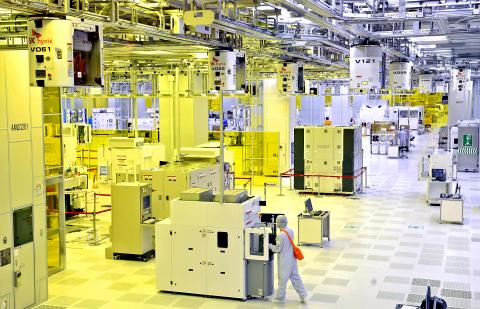South Korea’s SK Hynix Inc, the world’s second-largest memorychip manufacturer, yesterday announced it would spend 46 trillion won (US$38.9 billion) in facility investments over the next 10 years.
The plan was unveiled by SK Group chairman Chey Tae-won — newly released from prison by a presidential pardon — at a dedication ceremony for a new chip plant in Icheon, 80km southeast of Seoul.
The new plant is to eventually attract a total of 15 trillion won investment, with the remaining 31 trillion won going to building two more chip manufacturing plants — one in Icheon and the other in the city of Cheongju.

Photo: Reuters
SK Hynix reported a 65 percent year-on-year increase in second-quarter net profit, missing analyst estimates, as slowing demand for PCs and smartphones dampened memorychip prices.
Chey, 54, received his pardon on Aug. 13 after serving 31 months of a 48-month prison sentence for embezzling 46.5 billion won from two SK Group affiliates.
South Korean President Park Geun-hye said her decision to free Chey had been motivated by a need to “revitalize the economy.”
On his release from prison, Chey promised to work for the “economic and social development of our nation.”

On Tuesday, US President Donald Trump weighed in on a pressing national issue: The rebranding of a restaurant chain. Last week, Cracker Barrel, a Tennessee company whose nationwide locations lean heavily on a cozy, old-timey aesthetic — “rocking chairs on the porch, a warm fire in the hearth, peg games on the table” — announced it was updating its logo. Uncle Herschel, the man who once appeared next to the letters with a barrel, was gone. It sparked ire on the right, with Donald Trump Jr leading a charge against the rebranding: “WTF is wrong with Cracker Barrel?!” Later, Trump Sr weighed

HEADWINDS: Upfront investment is unavoidable in the merger, but cost savings would materialize over time, TS Financial Holding Co president Welch Lin said TS Financial Holding Co (台新新光金控) said it would take about two years before the benefits of its merger with Shin Kong Financial Holding Co (新光金控) become evident, as the group prioritizes the consolidation of its major subsidiaries. “The group’s priority is to complete the consolidation of different subsidiaries,” Welch Lin (林維俊), president of the nation’s fourth-largest financial conglomerate by assets, told reporters during its first earnings briefing since the merger took effect on July 24. The asset management units are scheduled to merge in November, followed by life insurance in January next year and securities operations in April, Lin said. Banking integration,

LOOPHOLES: The move is to end a break that was aiding foreign producers without any similar benefit for US manufacturers, the US Department of Commerce said US President Donald Trump’s administration would make it harder for Samsung Electronics Co and SK Hynix Inc to ship critical equipment to their chipmaking operations in China, dealing a potential blow to the companies’ production in the world’s largest semiconductor market. The US Department of Commerce in a notice published on Friday said that it was revoking waivers for Samsung and SK Hynix to use US technologies in their Chinese operations. The companies had been operating in China under regulations that allow them to import chipmaking equipment without applying for a new license each time. The move would revise what is known

Artificial intelligence (AI) chip designer Cambricon Technologies Corp (寒武紀科技) plunged almost 9 percent after warning investors about a doubling in its share price over just a month, a record gain that helped fuel a US$1 trillion Chinese market rally. Cambricon triggered the selloff with a Thursday filing in which it dispelled talk about nonexistent products in the pipeline, reminded investors it labors under US sanctions, and stressed the difficulties of ascending the technology ladder. The Shanghai-listed company’s stock dived by the most since April in early yesterday trading, while the market stood largely unchanged. The litany of warnings underscores growing scrutiny of